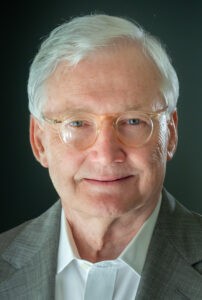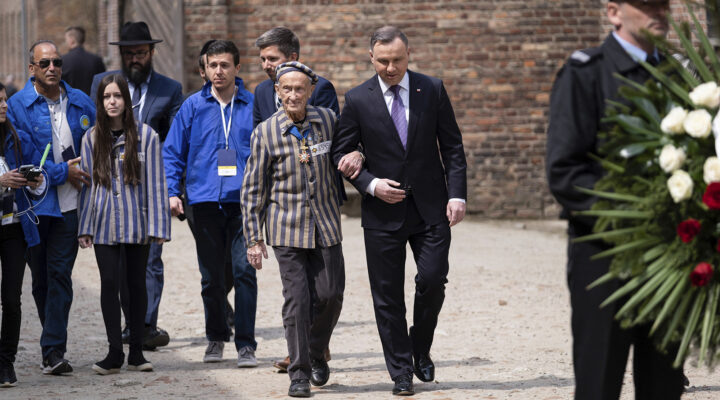Last week we observed Shoah, or Holocaust, Remembrance Day. It is well, then, to consider the original sin of the church. If America’s original sin is slavery, the original sin of the church is anti-Judaism and antisemitism.
Before the New Testament was fully written. we see evidence of it. By the mid-first century, the synagogue and the church were undergoing a painful divorce, and things were being said that often are said in such a time. It went both ways. The tragedy is that the church has taken those early writings and made them normative, turned them into anti-Judaism and antisemitism.

Stephen Shoemaker
If you look at the passion accounts in the four Gospels in chronological order, you see Rome being made less and less the villain of the death of Jesus and the Jews more and more the villain. By the time you get to John, the term “the Jews” often is used with negative associations.
Fast forward to the Middle Ages in Europe where virulent anti-Judaism and antisemitism were taught in the churches, which helped set the stage for the Holocaust. Centuries of anti-Judaism and antisemitism were bred in the churches — Martin Luther, tragically, no exception.
In the passion plays, the Jews were portrayed as the evil “Christ-killers.” Sometimes a Jew would be dragged on stage and the whiskers of his beard pulled out. Mel Gibson’s film The Passion Of The Christ, mimicked the antisemitism and anti-Judaism of this tradition.
When I was in Charlotte, the senior rabbi of Temple Beth-el, Judy Schindler, and I took our two congregations to see a viewing of the movie as an occasion to address Christian anti-Judaism and antisemitism. Watching it was most painful for our Jewish friends. There was apprehension going in, and there was tenseness after the movie before we followed the viewing with a fruitful and healing discussion at the synagogue.
In our nation’s early years, European anti-Jewish bigotry carried on in full voice. When Roger Williams, father of the Baptist movement in America, founded Rhode Island as a colony of religious toleration and religious freedom, the charter read that the colony would be open to “Protestants, Papists (Catholics), Turks (Muslims) and Jews. The first Jewish synagogue in America was established there. Rhode Island became a laboratory of the doctrines of religious freedom and religious toleration later inscribed in the First Amendment to the Constitution.
“In our nation’s early years, European anti-Jewish bigotry carried on in full voice.”
But anti-Jewish hatred persists. New York Times writer Michele Goldberg wrote last week about the alarming rise in antisemitism of late. The Anti-Defamation League reported last week that there were more antisemitic incidents reported in 2021 than in any year since it it began tracking them more than 40 years ago. Anti-Semitism increased under Donald Trump’s presidency, she wrote, and has only gotten worse since.
The white supremacist rally in Charlottesville, Va., in August 2017 paraded vicious anti-Jewish signs and shouted anti-Jewish slogans, some straight from the Nazism of the Third Reich. Such activity has carried on in increasing measure since. Antisemitism is part of the deadly brew of white supremacy.
The church has been slow to raise its voice against anti-Jewish hatred and slower to examine its 2,000 years of complicity in the violence against Jews and Judaism. It is my conviction that on every Ash Wednesday the first of the sins to be confessed by the church and Christians should be the public confession of the church’s original sin, antisemitism and anti-Judaism.
Martin Niemoller, the German pastor and theologian and prominent leader in the Confessing Church Movement that stood against the Nazification of the German church, is most famous for these words: “First they came for the socialists, and I did not speak out because I was not a socialist. Then they for the trade unionists, and I did not speak out because I was not a trade unionist. Then they came for the Jews, and I did not speak out because I was not a Jew. Then they came for me and there was no one left to speak for me “
These are still alarming words, most relevant in our day when the scapegoating of people who are different and vulnerable is becoming a political mainstay in our culture, a near guarantee of votes and bucks. But there is an important and hopeful thing to know about Niemoller: Earlier he was a Nazi, and he changed. Every day we can choose for Christ and truth and love.
Stephen Shoemaker serves as pastor of Grace Baptist Church in Statesville, N.C. He served previously as pastor of Myers Park Baptist in Charlotte, N.C.; Broadway Baptist in Fort Worth, Texas, and Crescent Hill Baptist in Louisville, Ky.
Related articles:
The sacred work of white discomfort | Opinion by Robert P. Jones
History shows the view is best from the margins | Opinion by David Gushee


